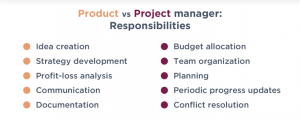Product Manager vs Project Manager: 12 Key Differences

Table Of Content
- 12 Key Differences: Product vs Project Manager
- How Jaro Education Helps You Choose the Right Path
- Empower Your Career with the Right Learning Path
12 Key Differences: Product vs Project Manager
*productplan.com
Below is a structured list comparing product manager vs project manager across dimensions such as focus, responsibilities, metrics, skills, growth, and more. Wherever helpful, tables or bullet points are used for clarity.
1. Core Focus: Vision vs Delivery
Product Manager (PM)
The product manager defines what to build and why. They are responsible for the product vision, strategy, roadmap, and aligning the product with market needs and business goals.
Their focus is on outcomes, customer value, adoption, revenue, retention.
Project Manager (PM)
The project manager focuses on how and when to deliver. They take a defined deliverable or scope and execute it within constraints (time, cost, resources).
Their focus is on outputs, tasks completed, deadlines met, budgets adhered to.
So, in the product manager vs project manager debate: product sets direction and defines value; project brings structure and discipline to execution.
2. Lifecycle vs Fixed Timeline
Product Manager:
A product lives through a lifecycle: ideation, launch, growth, maturity, and eventual retirement. There is continuity and iteration.
Project Manager:
Projects are bounded with a defined start, scope, and end. Once a project is delivered, the project manager may move to another project.
Thus, in product manager vs project manager roles, the product role often involves long-term stewardship, while the project role pivots from one initiative to another.
3. Responsibility Scope & Ownership

*jelvix.com
| Dimension | Product Manager | Project Manager |
| Ownership | Entire product — from strategy to performance | Specific deliverables, budget, schedule |
| Stakeholders | Customers, business, marketing, sales, support | Internal teams, sponsors, vendors, clients |
| Decision authority | High — product direction, feature tradeoffs | Moderate — deciding task dependencies, resource allocation |
| Accountability | Metrics like adoption, retention, profitability | Metrics like on-time delivery, budget adherence, scope variance |
In the product manager vs project manager comparison, product roles demand broader cross-functional accountability, while project roles demand rigorous execution discipline.
4. Skill Sets: Strategy vs Process
Product Manager
Key skills include market research, product discovery, user empathy, roadmap prioritization, data analytics, business modeling, A/B testing, stakeholder communication, and product marketing alignment.
Project Manager
Core skills revolve around planning, scheduling, risk management, resource allocation, budgeting, communication, status tracking, and change management.
There’s overlap in leadership, communication, and stakeholder management, but product roles demand more strategic and market-facing skills, while project roles emphasize operational mastery.
5. Metrics & Success Criteria
Product Manager:
Success is measured by outcome metrics: e.g. active users, retention, conversion rate, revenue, user satisfaction (NPS), churn, market share.
Project Manager:
Success is measured by process metrics: on-time delivery, within budget, meeting scope, quality, stakeholder satisfaction.
When choosing between product vs project manager roles, consider whether you’re more inclined toward impact metrics or delivery metrics.
6. Time Horizon & Planning
Product Manager:
Plans over multiple horizons: strategic (1–3 years), mid-term (6–12 months), short-term (sprint-level). Product roadmaps adjust as market feedback arrives.
Project Manager:
Plans phases, tasks, milestones, dependencies, and resource allocation across the project’s duration. The plan is detailed and fixed (to the extent possible), with change control mechanisms.
Hence, the product manager vs project manager difference also shows up in planning styles, adaptive vs structured.
7. Risk & Change Management
Product Manager:
Acts proactively to validate assumptions, perform experimentation, pivot when necessary. Risk is often in market acceptance or feature fit.
Project Manager:
Manages risk in execution: scope creep, budget overruns, schedule delays, resource constraints. Emphasis is on mitigation, contingency planning, tracking deviations.
Thus, in a product manager vs project manager setting, the nature of “risk” each deals with is different, strategic vs operational.
8. Career Path & Progression
Product Manager:
Career path might go: Associate Product Manager → Product Manager → Senior PM → Principal / Group Product Manager → Director / VP / Chief Product Officer (CPO).
Project Manager:
Paths often include: Project Coordinator → Project Manager → Program Manager → Portfolio Manager → Head of PMO / Director of Projects.
Sometimes professionals transition between the two. But in the product manager vs project manager decision, your long-term interest in strategic ownership or execution leadership helps guide which path fits you.
9. Industry Demand & Applicability
Product Manager:
Highly in demand in tech product-led companies, SaaS firms, digital services, consumer internet, fintech, AI, marketplace platforms, etc. The role is critical wherever products (software, apps, platforms) are core.
Project Manager:
Broadly applicable across industries: IT services, construction, manufacturing, healthcare, infrastructure, consulting. Wherever structured projects are executed, project managers are needed.
Thus, in many organizations, both roles complement each other—product defines what to build, project ensures it gets built.
10. Salary Comparison (Product Manager vs Project Manager Salary)
While compensation varies across industry, location, company size, and seniority, here’s a comparison based on available data:
Product Manager Salary (India)
- According to Upraised, PM salaries range between ₹8–55 lakhs depending on experience and including variable/ESOP components.
- Foundit reports mid-level product managers earning ₹15–30 LPA; in product-centric firms, senior roles may command ₹40–50 LPA or more.
- Some data suggests average salaries (including bonuses) around ₹15,00,000 per year.
Project Manager Salary (India)
- According to ProductLeadership, project managers in India earn between ₹6–24 lakhs based on experience and domain.
- A Glassdoor average for “Project And Product Manager” shows base pay around ₹5.75 lakhs/year (but this may reflect blended roles)
- Levels.fyi puts project manager compensation (total) in India with median ~₹1.93M (~₹19.3 lakhs) and range to ~₹3.84M.
Summary Comparison (for mid-career roles)
In many cases, product manager vs project manager salary can be comparable at mid-levels, but product roles often offer a higher ceiling via impact, equity, or strategic leadership.
11. Advantages & Challenges
Product Manager:
Pros
- High strategic impact and visibility
- Opportunity to shape solutions that serve users
- Potential for higher upside through equity or performance
- Continuous learning through experimentation and iteration
Challenges
- Ambiguous boundaries and tradeoffs
- Handling conflicting stakeholder demands
- Pressure of market expectations and competitive dynamics
- Requires skills across domains (business, tech, design)
Project Manager:
Pros
- Clear structure, process orientation
- Predictable scope and deliverables
- Transferable skills across industries
- High demand in many sectors
Challenges
- Less influence over product direction
- Dependence on others’ decisions and inputs
- Risk of scope creep or shifting priorities
- Sometimes less exciting in terms of innovation
When evaluating product vs project manager roles, weigh whether you prefer ambiguity and vision or structure and predictability.
12. Collaboration & Overlap
The two roles often collaborate closely:
- A product manager defines a feature or product increment; the project manager crafts the project plan to deliver it.
- In Agile setups, the product manager (or product owner) maintains the backlog and prioritizes features, while the project manager (or scrum master) ensures the team executes efficiently.
- Overlaps in stakeholder communication, cross-functional coordination, and reporting are common.
“Product managers decide what to build and release. Project managers coordinate people to get those features completed on time, on budget.”
Thus, though distinct, synergy between product and project roles is critical to delivering successful products.
How Jaro Education Helps You Choose the Right Path
Navigating the choice between a product manager vs project manager role, and building the requisite skills, can be pivotal in your growth journey. Here’s how Jaro Education supports professionals seeking clarity and excellence in either path.
Course & Program Offerings
Jaro partners with prestigious institutions (IITs, IIMs, and top universities) to design programs that reflect real-world demands. As a service partner, not merely a distributor, Jaro ensures you get a rigorous curriculum, mentorship, and career readiness support.
Blended Post Graduate Program in Management MBA (MBA – BPGP) – IIM Mumbai
- Duration: 2 Years
- Format: Blended Learning (On Campus + D2D)
- Skills Covered: Covering all dimensions of general management—Operations, Supply Chain, Marketing, Finance, Data Science, Environment, and Human Resources, the curriculum also allows participants to specialise in their chosen domain during the second year.
- Ideal for: IT professionals, operations leads, consultants, infrastructure or service delivery leaders
- Support: Real-Time Interactions with Esteemed IIM Mumbai Faculty, Peer Learning and Networking, Eclectic Pedagogy
Even though Jaro is not the degree-awarding body, we ensure that you benefit from academic rigor, exposure to industry practices, and career-focused support. For degree-level programs, Jaro provides career guidance and counseling, while the partner university awards the degree.
Unique Value & Highlights
- Personalized Counseling & Mentorship
Every learner is paired with a career guidance counselor who helps map your trajectory, whether toward product or project paths. - Industry-Relevant Curriculum
The curriculum is co-designed with industry experts to reflect current trends, frameworks, tools, and case studies. - Jaro Connect & Alumni Network
Access to networking, guest lectures, peer groups, and an alumni community that supports job search, mentorship, and collaboration.
Start your learning journey today, explore our programs and get personalized guidance from our experts to chart your path in product or project management.
Empower Your Career with the Right Learning Path
In the tug-of-war between product manager vs project manager, neither role is better universally, they each serve distinct purposes. What matters is aligning your passion, strengths, and long-term goals with the right role. If you enjoy shaping a vision, defining what users need, and steering strategy, product management may resonate with you. If you prefer clarity, process, execution rigor, and ensuring teams deliver, project management may be your forte.
Whichever path you choose, upskilling through structured, industry-backed programs is key to gaining credibility, learning frameworks, and bridging to real roles. That’s where Jaro’s curated, expert-led education and mentoring support can make a pivotal difference, helping professionals unlock new opportunities in evolving domains.
Frequently Asked Questions
Jaro offers personalized counseling, academic guidance, and access to Jaro Connect, which provides career services, alumni networking, and industry insights.
Yes. Jaro’s programs are designed with flexibility in mind—through online/live sessions—making them ideal for full-time working professionals.
Find a Program made just for YOU
We'll help you find the right fit for your solution. Let's get you connected with the perfect solution.

Is Your Upskilling Effort worth it?

Are Your Skills Meeting Job Demands?

Experience Lifelong Learning and Connect with Like-minded Professionals

